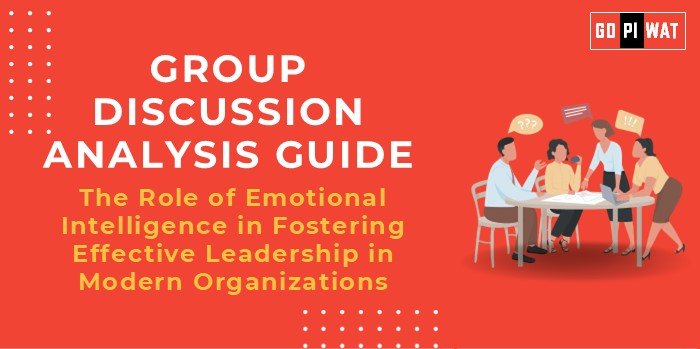📋 Group Discussion Analysis Guide: The Role of Emotional Intelligence in Fostering Effective Leadership in Modern Organizations
🌐 Introduction to the Topic
Opening Context: “In a rapidly changing corporate landscape, technical skills alone are no longer sufficient to lead. Emotional Intelligence (EI)—a blend of self-awareness, empathy, and interpersonal skills—has emerged as a key driver of effective leadership, fostering workplace harmony and improving organizational outcomes.”
Topic Background: The term Emotional Intelligence was popularized by Daniel Goleman in the 1990s, who defined it as the ability to recognize and manage one’s own emotions while influencing others’ emotional states. Today, modern organizations, driven by hybrid work cultures and multicultural teams, rely on leaders who can leverage EI to build trust, motivate employees, and drive performance.
📊 Quick Facts and Key Statistics
📈 Leadership Impact: Teams led by leaders with high EI report a 25% higher productivity rate.
🙋♀️ Retention Rates: Companies emphasizing EI in leadership training experience 20% lower employee turnover.
🧩 Recruitment: 71% of hiring managers prioritize EI over IQ during leadership hiring.
🤝 Stakeholders and Their Roles
- 🏢 Leaders: Drive organizational goals by balancing people management and performance.
- 👩💼 HR Departments: Integrate EI-focused training into leadership development programs.
- 👩👩👧👦 Employees: Contribute to team harmony and productivity by improving self-management skills.
- 🏦 Organizations: Foster EI-centric cultures to improve retention, collaboration, and innovation.
- 🎓 B-Schools: Incorporate EI training in leadership courses to prepare future managers.
🏆 Achievements and Challenges
✨ Achievements:
- ✔️ Improved Team Performance: Google’s Project Aristotle (2015) showed psychological safety (an EI component) led to higher team success.
- ✔️ Conflict Resolution: Leaders with high EI resolve interpersonal conflicts faster, fostering cohesive teams.
- ✔️ Retention and Morale: Organizations emphasizing empathy in leadership report 30% better employee satisfaction rates.
- ✔️ Adaptability: EI enables leaders to adapt during crises, such as managing hybrid workforces during COVID-19.
⚠️ Challenges:
- ❓ Measuring EI: Unlike technical skills, EI is subjective and harder to quantify.
- ❓ Bias in Promotion: Leaders with higher IQ may be overlooked if organizations misjudge EI as “soft skills.”
🌍 Global Comparisons:
- 🇳🇴 Nordic Countries: Emphasize emotional well-being in leadership training, leading to happier workforces.
- 🇯🇵 Asian Cultures: EI practices like open communication are underutilized due to hierarchical norms.
📚 Case Study:
- 🎯 Satya Nadella (Microsoft CEO): Prioritized empathy and emotional awareness, leading to cultural transformation and a 230% rise in Microsoft’s market value since 2014.
🗣️ Structured Arguments for Discussion
Supporting Stance: “Emotional Intelligence allows leaders to create psychologically safe environments, enabling teams to innovate without fear of failure.”
Opposing Stance: “Overemphasis on Emotional Intelligence can dilute accountability and distract leaders from result-driven performance.”
Balanced Perspective: “While Emotional Intelligence fosters team trust, it must be balanced with performance metrics to ensure business goals are met.”
💡 Effective Discussion Approaches
- 📜 Opening Approaches:
- “Harvard studies show that 70% of workplace conflicts arise due to poor emotional intelligence among leaders.”
- “Leadership is no longer about control; it is about empathy, self-regulation, and driving collective success through EI.”
- 🛠️ Counter-Argument Handling:
- Example: “While some view EI as soft, research proves it directly impacts team productivity and financial performance, as seen in Microsoft’s leadership model.”
📈 Strategic Analysis of Strengths and Weaknesses
- 🏅 Strengths: Improves communication and teamwork, enhances leader-employee trust and morale.
- ⚠️ Weaknesses: Hard to measure objectively, potential misuse in avoiding tough decisions.
- 💡 Opportunities: EI-centric leadership development programs, tools for evaluating EI during recruitment.
- ⚡ Threats: Organizations failing to balance EI with accountability, resistance from traditional leadership styles.
🎓 Connecting with B-School Applications
- 📚 Real-World Applications: Case studies on empathy-driven leadership (e.g., Microsoft, Google), EI’s role in crisis management during global uncertainties.
- 💬 Sample Interview Questions:
- “How can leaders balance emotional intelligence and result-oriented leadership?”
- “Discuss a time when EI played a critical role in solving team conflicts.”
- 🔑 Insights for B-School Students: Leaders who combine empathy with decision-making outperform peers. EI skills are essential for global team management and cross-cultural leadership.


